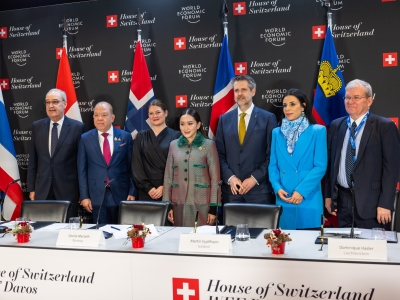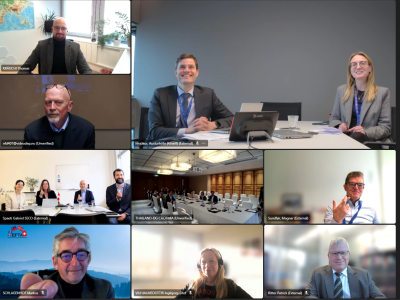About
On 29 November 2024, Member States of the European Free Trade Association – Iceland, Liechtenstein, Norway, and Switzerland – and the Kingdom of Thailand concluded a Free Trade Agreement. Further details can be found in a Chapter-by-Chapter Fact Sheet. The EFTA-Thailand FTA was signed on 23 January 2025 in Davos, Switzerland. Its entry into force is currently pending.
Negotiations towards a free trade agreement with Thailand were originally launched in October 2005, and two rounds were held between 2005 and 2006. Negotiations were relaunched in June 2022 at the Ministerial meeting in Borgarnes, Iceland. Ten rounds of negotiations followed, the latest from 19 to 23 August 2024 in Geneva, Switzerland.
Key facts
- Population
71,702,435 (2023)
- GDP
USD 514,968.70 million (2023)
- Date of Signature of the Agreement
23.01.2025
(FTA)
- Date of Entry Into Force
Pending
(Thailand, Iceland, Liechtenstein, Norway, Switzerland)
- Imports to EFTA States
EUR 1,815 million (2023)
- Exports from EFTA States
EUR 1,431 million (2023)
Information about agreement
Summary
As an ambitious and broad-based free trade agreement, the EFTA–Thailand FTA covers trade in goods and services, investment, intellectual property rights, competition, government procurement, trade and sustainable development, and legal and horizontal provisions and contains chapters on small and medium-sized enterprises and on cooperation and capacity building.
Trade between the Parties has been growing over the last ten years. In 2023, total trade reached USD 3.2 billion between the EFTA States and Thailand, of which USD 1.8 billion represented imports from Thailand and USD 1.4 billion were exports from the EFTA States. Exports from the EFTA States to Thailand had an average annual growth rate of 2.8% over the last five years, whereas the annual growth rate of imports into EFTA from Thailand averaged 8.5% in the same time period.
Negotiations towards the comprehensive FTA originally began in October 2005, with two rounds held between 2005 and 2006. Negotiations then were re-launched by EFTA Ministers and Thailand’s Deputy Prime Minister during EFTA’s Ministerial meeting in June 2022, in Borgarnes, Iceland, with a first negotiating round taking place the same month in Bangkok, while the tenth and final round was held in Geneva, Switzerland in August 2024.
Alongside the FTA negotiations EFTA commissioned an ex-ante sustainability impact assessment (SIA) on a potential FTA with Thailand. The final report was published on 26 September 2024. The SIA, which bases itself on quantitative and qualitative methodology, highlights some of the potential economic and sustainability outcomes of an EFTA–Thailand FTA, including positive economic impacts, increased foreign direct investment, and a net reduction in global emissions due to trade diversion effects. The report also makes recommendations to ensure that the implementation of the FTA does not impact sustainability issues. The full SIA can be found here.
Content of the Free Trade Agreement
Useful information for SMEs
The EFTA-Thailand Free Trade Agreement (signed; not yet in force) provides multiple benefits to small and medium-sized enterprises (SMEs).
The dedicated SME chapter provides a basis for information sharing and cooperation between the Parties to enhance the ability of SMEs to benefit from the FTA.
The Parties are required to publish a wide set of trade and other business-relevant information on publicly and freely accessible websites, to a large extent in English. Curious about the information for the EFTA States?
The Parties shall seek to cooperate among others on policy experiences, as well as on any matter brought to their attention by their SMEs in their trade and investment activities.
The SME chapter comes on top of other beneficial commitments for SMEs throughout the EFTA-Thailand FTA in the following areas (a detailed description can be found in this factsheet):
- Market access commitments for trade in goods and services;
- Enhanced framework conditions and national treatment commitments for investment;
- Trade facilitation and customs cooperation;
- The reduction of technical as well as sanitary and phytosanitary hurdles to trade;
- Strong commitments on intellectual property protection;
- Better framework conditions for public procurement;
- Commitments to facilitate trade by electronic means;
- The upholding of social and environmental protection in international trade.
Finally, in the FTA, specific reference is made to fostering the participation of small and medium-sized operators in government procurement.
Annexes
PAPs notifications
Statistics
For EFTA-Thailand trade statistics, see EFTA Trade Statistics Tool


